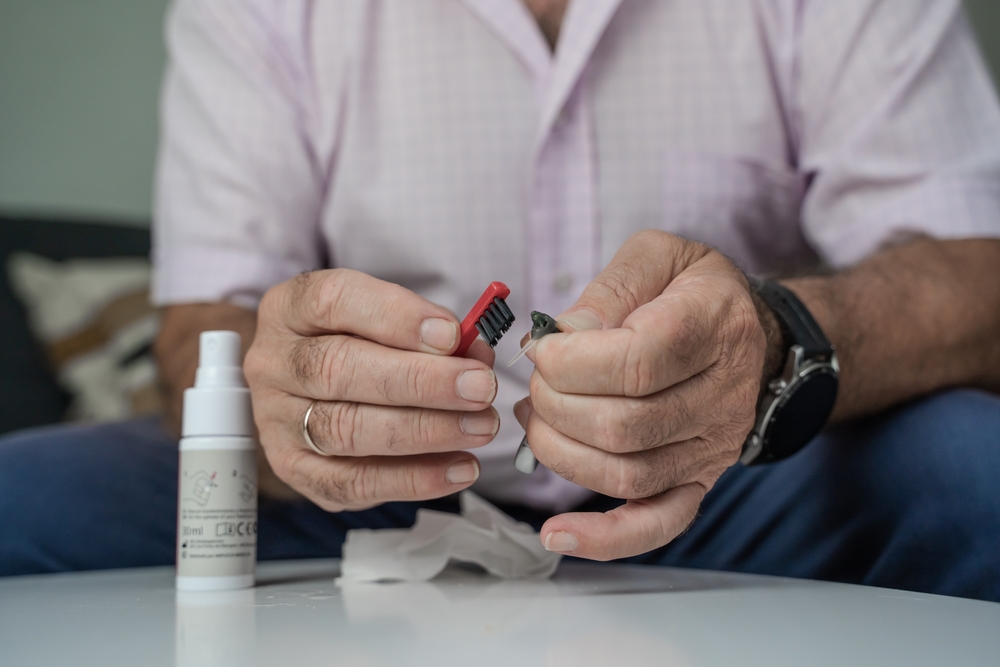Congratulations on your new hearing aid. You have just become the proud owner of a great piece of modern technology, but just like all new devices, there are things that hearing aid wearers wish someone had told them.
It would have saved them a lot of uncomfortable experiences.
Let’s look at nine common mistakes new hearing aid wearers make and how you can avoid them.
1. Not learning how hearing aids work
More specifically, know how your hearing aid works. It likely has unique features that drastically enhance the hearing experience in different settings like restaurants, theaters, or walking down the street.
It may be able to connect wirelessly to your smartphone, TV, stereo, or an auditorium’s sound system. In addition, it may have a specific setting that helps you hear on the phone.
If you don’t learn about these features, it’s so easy to get stuck into a rut, using your technologically-advanced hearing aid in a rudimentary way. Hearing aids these days can do more than make the sound louder.
To get the clearest and best sound, take some time to practice using the hearing aid in different settings. Ask a friend to help you so you can test how well you can hear.
Like anything new, it will get easier after a bit of practice. And your hearing experience will be 10X better than when you just turn the volume up and down.
2. Thinking that your hearing will instantly improve
In line with number one, many new hearing aid owners think their hearing will be perfect as they walk out of the audiologist’s office. This never happens. Some say it takes a month or more before they are entirely comfortable with their hearing aid. But don’t get discouraged. They also say it’s very worth it.
After getting home, give yourself a couple of days to get used to the new experience. It’s like breaking in a new pair of shoes. You may need to wear it in short intervals.
Start in a quiet setting with a friend where you are just talking. Simple voices may sound different at first, and this can be disorienting. Ask about your own voice volume and make adjustments.
Slowly start to visit new places and wear the hearing aid for more extended periods of time.
Many people buy a hearing aid. Then they don’t use it. They don’t get past this critical learning stage. Be patient with yourself, and you’ll have many great hearing experiences to look forward to.
3. Not being honest about your level of hearing loss during the hearing test
Be honest with yourself about what you can hear on these tests. Guessing the answer to a question correctly will negatively impact the analysis.
If you have your hearing aid and realize that maybe you weren’t as honest as you could have been, go back to your hearing care specialist and ask to be retested. Getting it right the first time is easier. The level and type of hearing loss will determine the hearing aid styles that work best for you.
For example, certain hearing aids are better for people with hearing loss in the high-frequency range. Others are better for people with mid-frequency hearing loss and so on.
4. Not getting a hearing aid fitting
Your hearing aids need to juggle several requirements at once: they need to be comfortable on or in your ears, they need to be easy to place and remove, and they need to amplify the sounds around you effectively. Your hearing aid fitting is intended to properly calibrate all three of those variables for your individual needs. It also helps ensure you’re getting the proper amplification.
Many individuals will require more than one session to get properly fitted. For example, the first session may involve a specialist taking earmold impressions (if you’re going with custom earpieces), while the second fitting session may be devoted to dialing in the correct settings for your device. It’s also not uncommon to need minor adjustments.
During hearing aid fitting sessions, you may:
- Undergo hearing tests to calibrate the correct power for your hearing aid.
- Have your ears precisely measured or have molds made (or both).
- Undergo special diagnostics designed to calibrate the power of your device.
5. Not tracking your results
Once you’ve been fitted, it’s important to take notes on how your hearing aid feels and performs. If you have trouble hearing in large rooms, make a note of that. If your right ear feels tighter than your left, make a note of that. If everything feels great, make a note. This can help hearing specialists make custom and minute changes to help your hearing aids reach peak comfort and effectiveness.
Share with your doctor to get the best hearing aid fitting.
6. Not anticipating how you’ll use your hearing aids
Some hearing aids are water-resistant. However, water can seriously damage others. Some have advanced features you may be willing to pay more for because you enjoy certain activities.
You might ask the opinion of a trusted friend or your doctor. But the decision must be yours. Only you know which advanced features you’ll actually use and that’s worth investing in, because if the hearing aids don’t fit in with the way you want to live you won’t wear them.
You and your hearing aid will be together for several years. So you don’t want to regret settling when you really would have benefited from a certain feature.
Preferences
You may really care about whether people can see your hearing aid. Or you may want to make a bold statement.
You may prefer something that is very automated. Or maybe you like having more control over the volume. Is a longer battery life important to you?
To be very satisfied, discuss these preferences before your fitting.
Many issues that come up regarding fit, lifestyle, and how you use your hearing aids can be addressed through the fitting process. In addition, many hearing aid manufacturers will allow you to demo the devices before deciding. During this trial period, you’ll be able to get a sense of whether a particular brand of hearing aids would meet your needs.
7. Not properly caring for your hearing aids
Most hearing aids are very sensitive to moisture. If you live in a humid place, getting a dehumidifier may be worth the money. Storing your hearing aid in the bathroom where people take baths or showers is a bad idea.
Always wash your hands before touching the hearing aid or batteries. Oils found naturally on your hand can impact how well the hearing aid works and the life of the batteries.
Don’t let earwax or skin cells build up on the hearing aid. Instead, clean it according to the manufacturer’s instructions.
Taking simple steps like these will improve the life and function of your hearing aid.
8. Not having spare batteries
New hearing aid wearers often learn this lesson at the worst times. When you find out who did it at the critical moment of your favorite show… Your batteries die without warning.
Like many electronic devices, battery life varies depending on how you use it and the outside environment. So always keep an extra set of batteries nearby, even if you just replaced them. Don’t miss out on something special because of an unpredictable battery.
9. Not practicing your hearing exercises
When you first get your hearing aids, there might be an assumption–and it’s not necessarily a baseless assumption–that your hearing aid will do all the work. But it’s not just your ears that are impacted by hearing loss–it’s also the parts of your brain responsible for interpreting all those sounds.
Once you’ve got your hearing aids, you’ll be able to start the work of rebuilding some of those ear-to-brain pathways and connections. This may happen quite naturally for some individuals–especially if the hearing loss was somewhat recent. But for others, an intentional strategy may be necessary to get your hearing firing on all cylinders again. A couple of common strategies include the following.
Reading out loud
One of the best ways you can recreate those connections between your ears and your brain is to spend some time reading out loud. It might feel a little silly at first, but don’t let that stop you. You’re doing the important work of connecting the word (which you read) to the sound (which you say). The more you create those connections, the better your hearing (and your hearing aid) will work.
Books on tape
If you don’t like the idea of reading something out loud yourself, then you can always go the book-on-tape route. You can purchase (or rent from the library) a physical copy of a book and the audiobook version of that same text. Then, you read along with the book as the audiobook plays. This does the same job as reading something out loud–you hear a word while you’re reading it. And that helps the hearing-and-language part of your brain get used to hearing (and making sense of) speech again.



